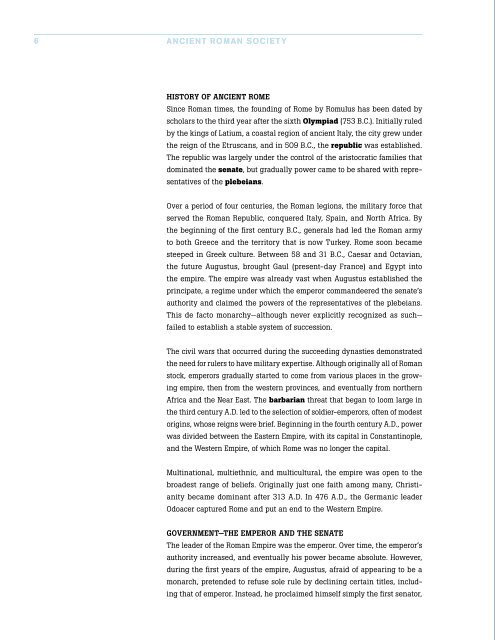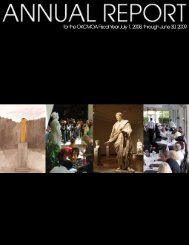Roman Art from the Louvre Educators' Resource Guide
Roman Art from the Louvre Educators' Resource Guide
Roman Art from the Louvre Educators' Resource Guide
You also want an ePaper? Increase the reach of your titles
YUMPU automatically turns print PDFs into web optimized ePapers that Google loves.
6<br />
Ancient <strong>Roman</strong> Society<br />
History of Ancient Rome<br />
Since <strong>Roman</strong> times, <strong>the</strong> founding of Rome by Romulus has been dated by<br />
scholars to <strong>the</strong> third year after <strong>the</strong> sixth Olympiad (753 B.C.). Initially ruled<br />
by <strong>the</strong> kings of Latium, a coastal region of ancient Italy, <strong>the</strong> city grew under<br />
<strong>the</strong> reign of <strong>the</strong> Etruscans, and in 509 B.C., <strong>the</strong> republic was established.<br />
The republic was largely under <strong>the</strong> control of <strong>the</strong> aristocratic families that<br />
dominated <strong>the</strong> senate, but gradually power came to be shared with representatives<br />
of <strong>the</strong> plebeians.<br />
Over a period of four centuries, <strong>the</strong> <strong>Roman</strong> legions, <strong>the</strong> military force that<br />
served <strong>the</strong> <strong>Roman</strong> Republic, conquered Italy, Spain, and North Africa. By<br />
<strong>the</strong> beginning of <strong>the</strong> first century B.C., generals had led <strong>the</strong> <strong>Roman</strong> army<br />
to both Greece and <strong>the</strong> territory that is now Turkey. Rome soon became<br />
steeped in Greek culture. Between 58 and 31 B.C., Caesar and Octavian,<br />
<strong>the</strong> future Augustus, brought Gaul (present-day France) and Egypt into<br />
<strong>the</strong> empire. The empire was already vast when Augustus established <strong>the</strong><br />
principate, a regime under which <strong>the</strong> emperor commandeered <strong>the</strong> senate’s<br />
authority and claimed <strong>the</strong> powers of <strong>the</strong> representatives of <strong>the</strong> plebeians.<br />
This de facto monarchy—although never explicitly recognized as such—<br />
failed to establish a stable system of succession.<br />
The civil wars that occurred during <strong>the</strong> succeeding dynasties demonstrated<br />
<strong>the</strong> need for rulers to have military expertise. Although originally all of <strong>Roman</strong><br />
stock, emperors gradually started to come <strong>from</strong> various places in <strong>the</strong> growing<br />
empire, <strong>the</strong>n <strong>from</strong> <strong>the</strong> western provinces, and eventually <strong>from</strong> nor<strong>the</strong>rn<br />
Africa and <strong>the</strong> Near East. The barbarian threat that began to loom large in<br />
<strong>the</strong> third century A.D. led to <strong>the</strong> selection of soldier-emperors, often of modest<br />
origins, whose reigns were brief. Beginning in <strong>the</strong> fourth century A.D., power<br />
was divided between <strong>the</strong> Eastern Empire, with its capital in Constantinople,<br />
and <strong>the</strong> Western Empire, of which Rome was no longer <strong>the</strong> capital.<br />
Multinational, multiethnic, and multicultural, <strong>the</strong> empire was open to <strong>the</strong><br />
broadest range of beliefs. Originally just one faith among many, Christianity<br />
became dominant after 313 A.D. In 476 A.D., <strong>the</strong> Germanic leader<br />
Odoacer captured Rome and put an end to <strong>the</strong> Western Empire.<br />
Government—The Emperor and <strong>the</strong> Senate<br />
The leader of <strong>the</strong> <strong>Roman</strong> Empire was <strong>the</strong> emperor. Over time, <strong>the</strong> emperor’s<br />
authority increased, and eventually his power became absolute. However,<br />
during <strong>the</strong> first years of <strong>the</strong> empire, Augustus, afraid of appearing to be a<br />
monarch, pretended to refuse sole rule by declining certain titles, including<br />
that of emperor. Instead, he proclaimed himself simply <strong>the</strong> first senator,
















